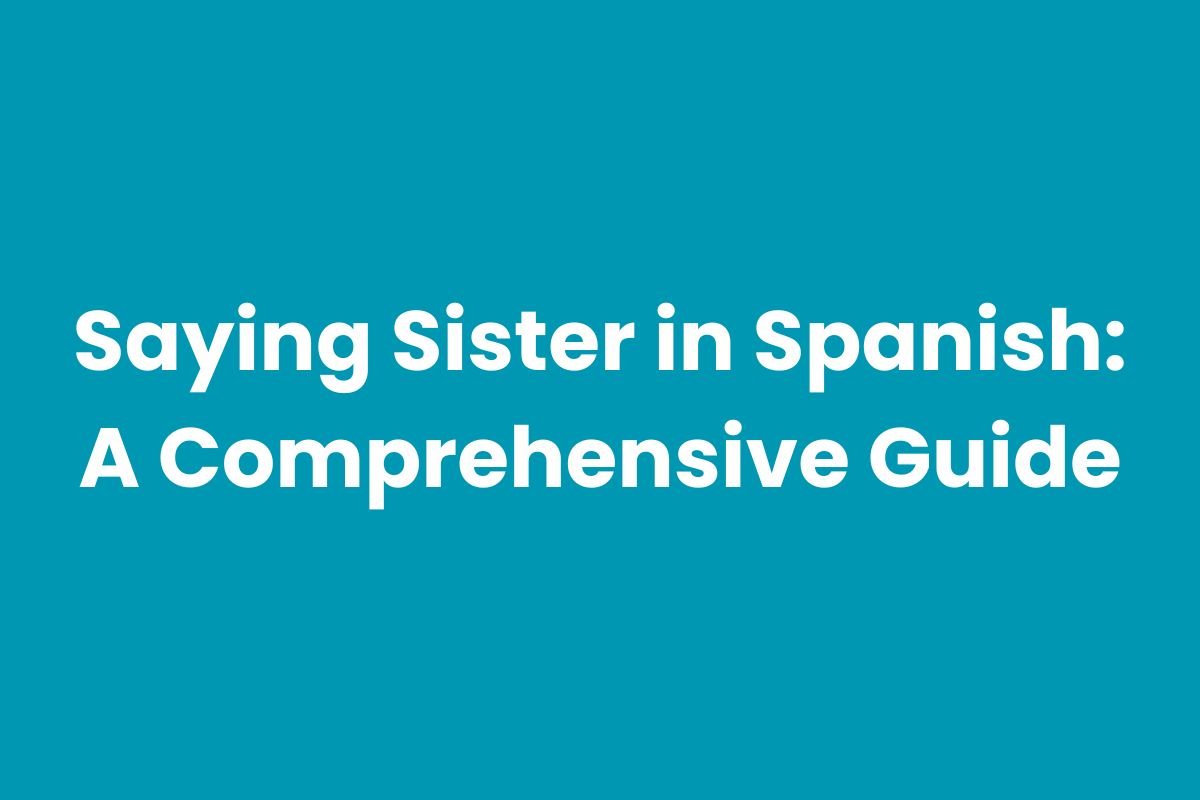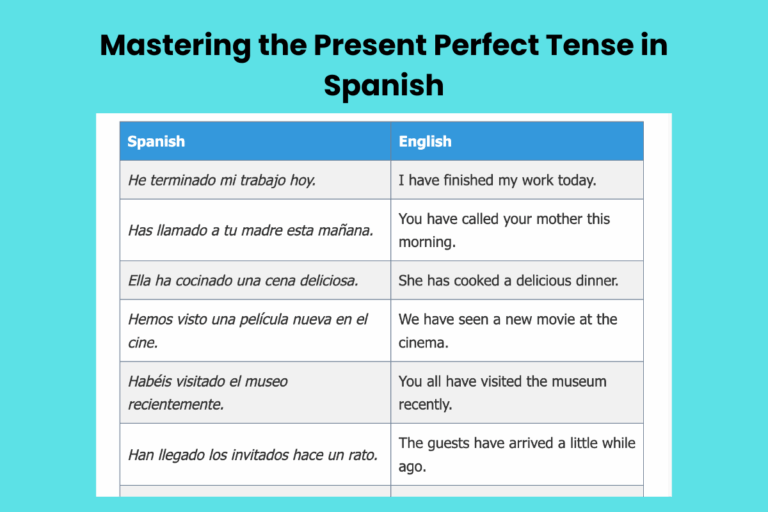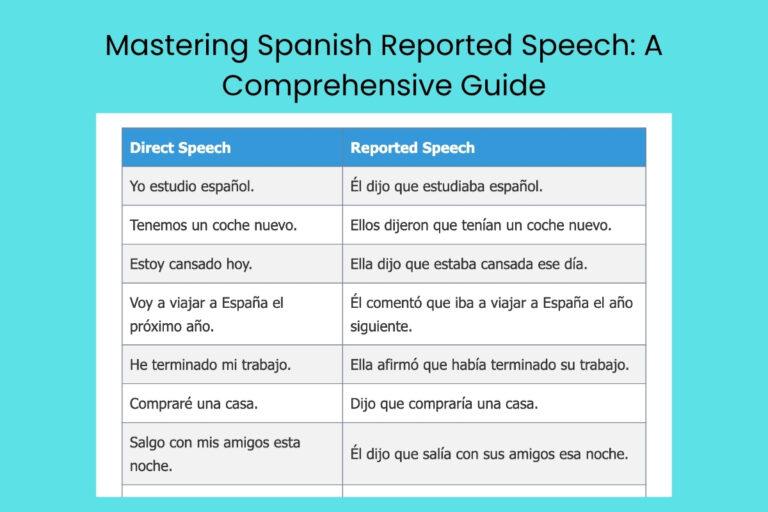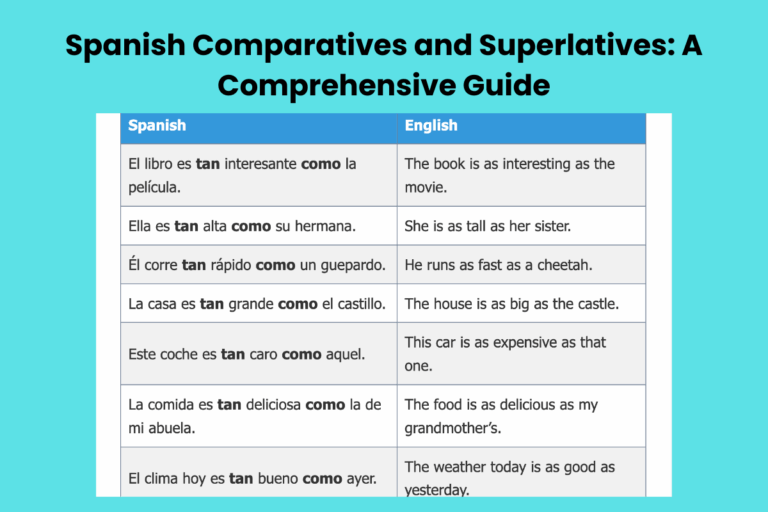Saying Sister in Spanish: A Comprehensive Guide
Understanding how to say “sister” in Spanish and related terms is crucial for anyone learning the language. It’s not just about vocabulary; it’s about understanding family relationships and cultural nuances.
This guide provides a comprehensive overview of the Spanish word for “sister,” its variations, and how to use it correctly in different contexts. This article is perfect for beginner to intermediate Spanish learners, travelers, and anyone interested in expanding their Spanish vocabulary and grammar skills related to family.
Mastering basic familial terms like “sister” provides a solid foundation for more complex conversations. This article breaks down the word “sister” in Spanish, exploring its grammatical function, regional variations, and common usage scenarios.
By the end of this guide, you’ll be able to confidently use “sister” and related terms in Spanish conversations.
Table of Contents
- Definition of “Sister” in Spanish
- Structural Breakdown: “Hermana”
- Types and Categories of “Sister”
- Examples of “Hermana” in Use
- Usage Rules for “Hermana”
- Common Mistakes When Using “Hermana”
- Practice Exercises
- Advanced Topics
- Frequently Asked Questions (FAQ)
- Conclusion
Definition of “Sister” in Spanish
The primary translation for “sister” in Spanish is hermana. This word is a feminine noun and refers to a female sibling who shares at least one parent with another person. The term is universally understood across all Spanish-speaking countries. Understanding its grammatical properties is essential for its correct usage.
Hermana functions as a noun, specifically a common noun, representing a general category of people (female siblings). It carries the grammatical gender of feminine, which influences the articles and adjectives used with it. For example, you would say la hermana (the sister) using the feminine definite article la.
The term hermana is used in various contexts, from casual conversations about family to more formal settings. It can be used to describe biological sisters, adopted sisters, or even close female friends who are considered like sisters. The context usually clarifies the exact relationship being described.
Structural Breakdown: “Hermana”
The word hermana is derived from the Latin word germanus, meaning “sibling.” The structure of the word is relatively straightforward. It consists of the root herman-, which signifies the sibling relationship, and the feminine ending -a, indicating that it refers to a female sibling.
The grammatical gender of hermana is feminine. This means it requires feminine articles (la, una) and feminine adjectives to agree with it. For example, you would say mi hermana mayor (my older sister), where both mi (my) and mayor (older) are in their feminine forms.
The plural form of hermana is hermanas. This is formed by adding an -s to the end of the word. When referring to multiple sisters, the plural form is necessary to maintain grammatical accuracy. For example, Tengo tres hermanas (I have three sisters).
Types and Categories of “Sister”
While the basic translation of “sister” is hermana, there are several ways to specify the type of sisterly relationship. These distinctions are important for clear communication.
Older vs. Younger Sister
To specify whether a sister is older or younger, you can use the adjectives mayor (older) and menor (younger) after hermana.
Hermana mayor: Older sister
Hermana menor: Younger sister
Half-Sister
A half-sister, who shares only one parent, is referred to as media hermana.
Media hermana: Half-sister
Step-Sister
A step-sister, who is the daughter of one’s step-parent, is called hermanastra.
Hermanastra: Step-sister
Sister-in-Law
A sister-in-law, the sister of one’s spouse or the wife of one’s brother, is referred to as cuñada.
Cuñada: Sister-in-law
Religious Sister (Nun)
In a religious context, a nun is referred to as hermana, although it is usually clarified with additional context.
Hermana religiosa: Religious sister (nun)
La hermana María: Sister Mary
Examples of “Hermana” in Use
Understanding the different ways to use hermana in sentences will solidify your understanding of the word. Here are various examples categorized for clarity.
Basic Sentences
These examples demonstrate simple uses of “hermana” in Spanish.
| Spanish | English |
|---|---|
| Tengo una hermana. | I have a sister. |
| Mi hermana se llama Ana. | My sister’s name is Ana. |
| Ella es mi hermana. | She is my sister. |
| ¿Tienes una hermana? | Do you have a sister? |
| Adoro a mi hermana. | I adore my sister. |
| Mi hermana es muy amable. | My sister is very kind. |
| La hermana de Juan es inteligente. | Juan’s sister is intelligent. |
| Somos hermanas. | We are sisters. |
| Mi hermana y yo vamos al cine. | My sister and I are going to the movies. |
| Mi hermana vive en Madrid. | My sister lives in Madrid. |
| Veo a mi hermana todos los domingos. | I see my sister every Sunday. |
| Quiero mucho a mi hermana. | I love my sister very much. |
| Mi hermana trabaja como doctora. | My sister works as a doctor. |
| Mi hermana está estudiando en la universidad. | My sister is studying at the university. |
| Voy a visitar a mi hermana la semana que viene. | I am going to visit my sister next week. |
| Mi hermana me ayuda mucho. | My sister helps me a lot. |
| Mi hermana es mi mejor amiga. | My sister is my best friend. |
| Estoy orgulloso de mi hermana. | I am proud of my sister. |
| Mi hermana siempre me apoya. | My sister always supports me. |
| Hablo con mi hermana todos los días. | I talk to my sister every day. |
Descriptive Sentences
These examples use adjectives to describe a sister.
| Spanish | English |
|---|---|
| Mi hermana mayor es muy alta. | My older sister is very tall. |
| Tengo una hermana pequeña. | I have a younger sister. |
| Mi hermana es muy creativa. | My sister is very creative. |
| Mi hermana es inteligente y trabajadora. | My sister is intelligent and hardworking. |
| Ella es una hermana maravillosa. | She is a wonderful sister. |
| Mi hermana es divertida y cariñosa. | My sister is fun and affectionate. |
| La hermana de Ana es simpática. | Ana’s sister is nice. |
| Mi hermana es una gran cocinera. | My sister is a great cook. |
| Mi hermana es muy deportista. | My sister is very athletic. |
| Mi hermana es una persona muy amable. | My sister is a very kind person. |
| Mi hermana es muy talentosa. | My sister is very talented. |
| Mi hermana es muy responsable. | My sister is very responsible. |
| Mi hermana es muy organizada. | My sister is very organized. |
| Mi hermana es muy paciente. | My sister is very patient. |
| Mi hermana es muy generosa. | My sister is very generous. |
| Mi hermana es muy optimista. | My sister is very optimistic. |
| Mi hermana es muy persistente. | My sister is very persistent. |
| Mi hermana es muy independiente. | My sister is very independent. |
| Mi hermana es muy aventurera. | My sister is very adventurous. |
| Mi hermana es muy curiosa. | My sister is very curious. |
Conversational Sentences
These examples show how to use “hermana” in everyday conversations.
| Spanish | English |
|---|---|
| ¿Cómo está tu hermana? | How is your sister? |
| Voy a visitar a mi hermana este fin de semana. | I’m going to visit my sister this weekend. |
| Mi hermana me llamó ayer. | My sister called me yesterday. |
| ¿Conoces a mi hermana? | Do you know my sister? |
| Mi hermana y yo vamos de compras. | My sister and I are going shopping. |
| ¿Qué hace tu hermana? | What does your sister do? |
| Mi hermana está de vacaciones. | My sister is on vacation. |
| Mi hermana me dio un regalo. | My sister gave me a gift. |
| Mi hermana se casa el próximo año. | My sister is getting married next year. |
| Mi hermana viene a cenar esta noche. | My sister is coming to dinner tonight. |
| Mi hermana me contó un chiste. | My sister told me a joke. |
| Mi hermana me invitó a su fiesta. | My sister invited me to her party. |
| Mi hermana me aconsejó. | My sister advised me. |
| Mi hermana me enseñó a cocinar. | My sister taught me how to cook. |
| Mi hermana me prestó su coche. | My sister lent me her car. |
| Mi hermana me acompañó al médico. | My sister accompanied me to the doctor. |
| Mi hermana me defendió. | My sister defended me. |
| Mi hermana me hizo reír. | My sister made me laugh. |
| Mi hermana me consoló. | My sister consoled me. |
| Mi hermana me sorprendió con una visita. | My sister surprised me with a visit. |
Sentences with Possessives
These examples demonstrate the use of possessive adjectives with “hermana.”
| Spanish | English |
|---|---|
| Esta es la casa de mi hermana. | This is my sister’s house. |
| El coche de tu hermana es nuevo. | Your sister’s car is new. |
| Su hermana es muy amable. | His/Her sister is very kind. |
| Nuestra hermana vive lejos. | Our sister lives far away. |
| Sus hermanas son estudiantes. | Their sisters are students. |
| El perro de mi hermana es pequeño. | My sister’s dog is small. |
| La amiga de tu hermana es inteligente. | Your sister’s friend is intelligent. |
| El trabajo de su hermana es interesante. | His/Her sister’s job is interesting. |
| La familia de nuestra hermana es grande. | Our sister’s family is big. |
| Los hijos de sus hermanas son encantadores. | Their sisters’ children are charming. |
| La opinión de mi hermana es importante. | My sister’s opinion is important. |
| El consejo de tu hermana es sabio. | Your sister’s advice is wise. |
| El talento de su hermana es impresionante. | His/Her sister’s talent is impressive. |
| La creatividad de nuestra hermana es notable. | Our sister’s creativity is remarkable. |
| La dedicación de sus hermanas es admirable. | Their sisters’ dedication is admirable. |
| El éxito de mi hermana es merecido. | My sister’s success is deserved. |
| La felicidad de tu hermana es contagiosa. | Your sister’s happiness is contagious. |
| La salud de su hermana es importante. | His/Her sister’s health is important. |
| El bienestar de nuestra hermana es prioritario. | Our sister’s well-being is a priority. |
| La seguridad de sus hermanas es esencial. | Their sisters’ safety is essential. |
Sentences with Verbs
These examples combine “hermana” with different verbs.
| Spanish | English |
|---|---|
| Mi hermana estudia medicina. | My sister studies medicine. |
| Tu hermana trabaja en un banco. | Your sister works at a bank. |
| Su hermana canta muy bien. | His/Her sister sings very well. |
| Nuestra hermana baila salsa. | Our sister dances salsa. |
| Sus hermanas viajan mucho. | Their sisters travel a lot. |
| Mi hermana cocina muy bien. | My sister cooks very well. |
| Tu hermana lee muchos libros. | Your sister reads many books. |
| Su hermana escribe poesía. | His/Her sister writes poetry. |
| Nuestra hermana pinta cuadros. | Our sister paints pictures. |
| Sus hermanas tocan instrumentos musicales. | Their sisters play musical instruments. |
| Mi hermana corre maratones. | My sister runs marathons. |
| Tu hermana nada en la piscina. | Your sister swims in the pool. |
| Su hermana juega al tenis. | His/Her sister plays tennis. |
| Nuestra hermana escala montañas. | Our sister climbs mountains. |
| Sus hermanas practican yoga. | Their sisters practice yoga. |
| Mi hermana enseña inglés. | My sister teaches English. |
| Tu hermana aprende francés. | Your sister learns French. |
| Su hermana habla alemán. | His/Her sister speaks German. |
| Nuestra hermana comprende italiano. | Our sister understands Italian. |
| Sus hermanas dominan el español. | Their sisters master Spanish. |
Usage Rules for “Hermana”
Correct usage of hermana involves understanding gender and number agreement, as well as the appropriate use of articles.
Gender Agreement
Hermana is a feminine noun, so it must agree with feminine articles and adjectives. For example, la hermana alta (the tall sister).
Number Agreement
When referring to more than one sister, use the plural form hermanas. For example, Tengo dos hermanas (I have two sisters).
Use of Articles
Use the definite article la (the) when referring to a specific sister, and the indefinite article una (a) when referring to any sister. For example, La hermana de Juan (Juan’s sister) vs. Tengo una hermana (I have a sister).
Diminutives and Augmentatives
Diminutives and augmentatives can be used to express affection or to indicate size or importance. A common diminutive form of hermana is hermanita (little sister), and an augmentative form could be hermanota (big sister, often used affectionately).
Common Mistakes When Using “Hermana”
One common mistake is using the masculine article with hermana. Remember that hermana is feminine, so always use feminine articles and adjectives.
| Incorrect | Correct | Explanation |
|---|---|---|
| El hermana | La hermana | Hermana is feminine, so use the feminine article la. |
| Tengo dos hermano | Tengo dos hermanas | When referring to more than one sister, use the plural form hermanas. |
| Mi hermana es alto | Mi hermana es alta | Adjectives must agree in gender with the noun they modify. |
Practice Exercises
Test your understanding with these practice exercises.
Translation Exercise
Translate the following sentences into Spanish.
| English | Spanish (Answer) |
|---|---|
| I love my sister. | Amo a mi hermana. |
| My older sister is a doctor. | Mi hermana mayor es doctora. |
| Do you have any sisters? | ¿Tienes hermanas? |
| Her sister is very kind. | Su hermana es muy amable. |
| Our sister lives in Spain. | Nuestra hermana vive en España. |
| My sister and I are going to the beach. | Mi hermana y yo vamos a la playa. |
| My sister is studying engineering. | Mi hermana está estudiando ingeniería. |
| I visited my sister last weekend. | Visité a mi hermana el fin de semana pasado. |
| My sister gave me a beautiful gift. | Mi hermana me dio un regalo hermoso. |
| My sister always supports me. | Mi hermana siempre me apoya. |
Fill-in-the-Blanks Exercise
Fill in the blanks with the correct form of “hermana.”
| Sentence | Answer |
|---|---|
| Tengo una _____. | hermana |
| Mis _____ son muy simpáticas. | hermanas |
| La _____ de Juan es profesora. | hermana |
| ¿Cuántas _____ tienes? | hermanas |
| Su _____ menor es muy inteligente. | hermana |
| Mi _____ mayor trabaja en un hospital. | hermana |
| Conozco a sus _____. | hermanas |
| ¿Cómo se llama tu _____? | hermana |
| Quiero mucho a mi _____. | hermana |
| Las _____ de María son gemelas. | hermanas |
Sentence Correction Exercise
Correct the following sentences.
| Incorrect | Correct |
|---|---|
| El hermana de Pedro es alta. | La hermana de Pedro es alta. |
| Tengo tres hermano. | Tengo tres hermanas. |
| Mi hermana es bajo. | Mi hermana es baja. |
| La hermanas de Ana son simpático. | Las hermanas de Ana son simpáticas. |
| Yo amo mi hermano. | Yo amo a mi hermana. |
| Él vive con su hermano. | Él vive con su hermana. |
| Nosotros visitamos nuestro hermano. | Nosotros visitamos a nuestra hermana. |
| Ustedes conocen mi hermano. | Ustedes conocen a mi hermana. |
| Ellos quieren sus hermano. | Ellos quieren a sus hermanas. |
| Yo veo mi hermano cada día. | Yo veo a mi hermana cada día. |
Advanced Topics
For advanced learners, exploring idiomatic expressions and regional variations can enhance your understanding of the word “hermana.”
Idiomatic Expressions with “Hermana”
While there aren’t many common idiomatic expressions specifically using “hermana,” the concept of sisterhood and family often appears in idioms. For example, “sangre de mi sangre” (blood of my blood) can be used to emphasize a strong family connection.
Regional Variations
While the word hermana is universally understood, some regions may have different slang or colloquial terms for referring to sisters or close female friends. However, hermana remains the standard and most widely accepted term.
Frequently Asked Questions (FAQ)
- Is “hermana” always used for biological sisters?
No, “hermana” can also be used for adopted sisters or close female friends who are considered like sisters. The context usually clarifies the relationship.
- How do I say “stepsister” in Spanish?
The word for “stepsister” in Spanish is “hermanastra.”
- What is the difference between “hermana mayor” and “hermana menor”?
“Hermana mayor” means “older sister,” while “hermana menor” means “younger sister.”
- How do I make “hermana” plural?
The plural form of “hermana” is “hermanas.”
- Can I use “hermano” to refer to a sister?
No, “hermano” is the masculine form and refers to a brother. Use “hermana” for a sister.
- How do I say “sister-in-law” in Spanish?
The word for “sister-in-law” in Spanish is “cuñada.”
- What article should I use with “hermana”?
Use the feminine article “la” (the) when referring to a specific sister, and “una” (a) when referring to any sister.
- Is there a diminutive form of “hermana”?
Yes, a common diminutive form is “hermanita,” which means “little sister.”
- How do I say “half-sister” in Spanish?
You say “half-sister” in Spanish as “media hermana.”
- Is it correct to say “mi hermana es alto”?
No, it’s incorrect. Since “hermana” is feminine, the adjective must agree in gender. The correct sentence is “Mi hermana es alta.”
Conclusion
Understanding how to say “sister” in Spanish, along with its variations and usage rules, is essential for effective communication. By learning the vocabulary, grammatical agreements, and common expressions, you can confidently discuss family relationships in Spanish. Practice using hermana in various contexts, and pay attention to gender and number agreement to avoid common mistakes. This guide provides a solid foundation for further exploration of Spanish vocabulary and grammar.
Remember that language learning is an ongoing process. Continue to practice, listen to native speakers, and explore different resources to enhance your understanding and fluency.
Mastering basic terms like “hermana” is a crucial step towards becoming proficient in Spanish. Keep practicing and you’ll be conversing about your family with ease!







